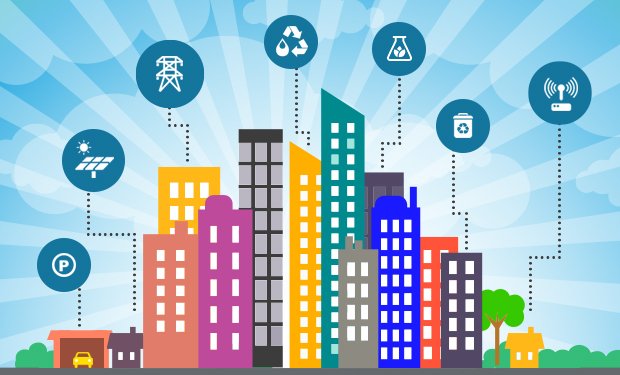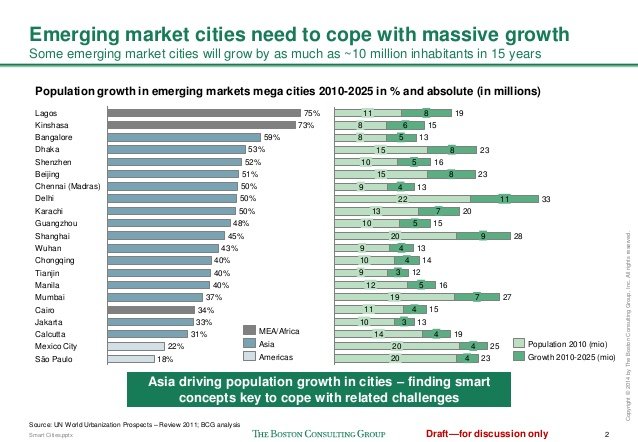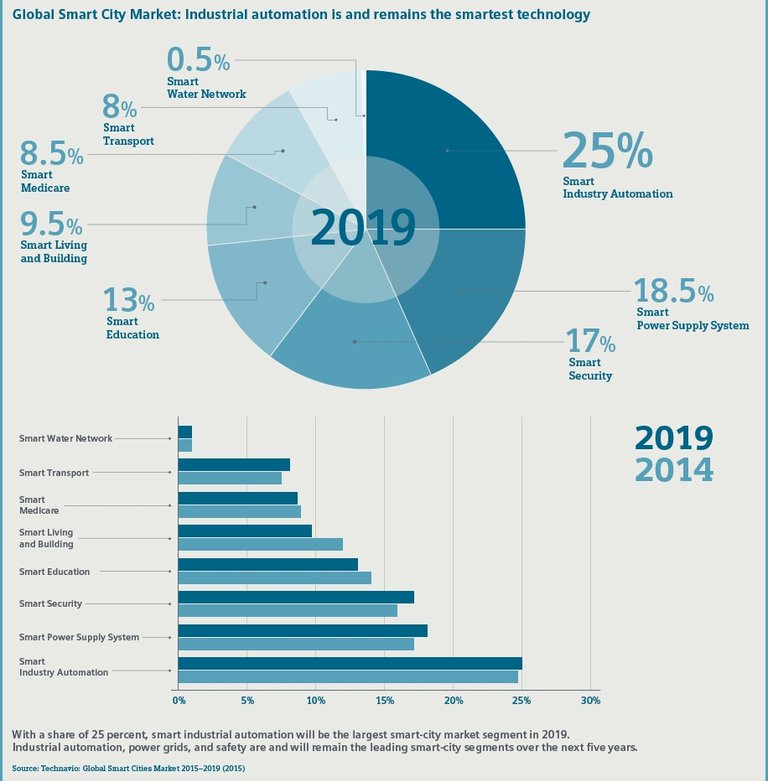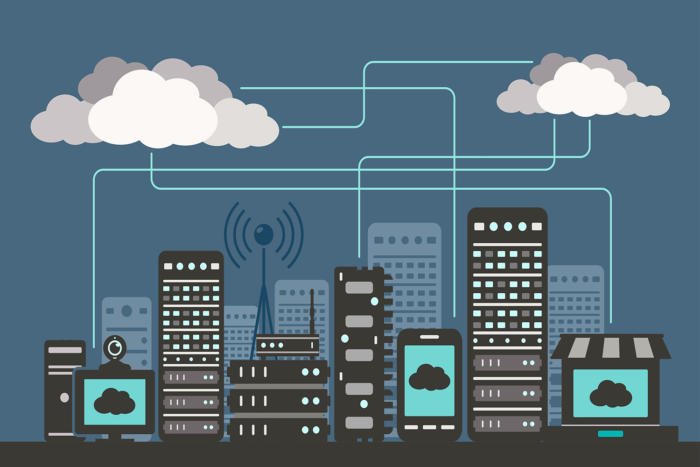
Source: DataBreachToday
According to Tech Republic[1], smart cities are likely going to be more than a trend, since there will be more than 60% population live in cities by 2050. At the same time, a technological breakthrough will likely accelerate the progress. In this article, we will talk about how decentralized cloud computing could help to shape the future of smart cities, especially how Deepcloud could contribute to this process.
Smart City 101
Before we discuss further, we should know a little bit about smart cities. What exactly are they? What makes them different from "regular city" or another kind of city? What makes them "smart" while the others are mediocre?
There are actually a lot of definitions about smart cities. Esmeralda Swartz, Head of Strategy and Marketing of the Software Business Unit for Ericsson told us that the common description about smart cities is that they utilize IoT sensors, actuators, and technology to connect components across the city.[2] These connections provide data communication between devices and in turn utilized it to improve the lives of the citizens.

Population growth and real demand for smart cities. Source: Slideshare
Bettina Tratz-Ryan, Gartner analyst, describes smart cities with several characteristics. First, whether a city is efficient at optimizing certain operations, technologies or infrastructure. Second, whether a city can share outcome or best practices with each other and citizen outcome. Third, whether a city looks at a person with individual needs or business groups with very specific needs.[3] In other words, whether a city can handle their citizen needs (including a specific one) using the appropriate technology that allows them to communicate and share data effectively, thus producing best practices.
More or less, the key difference between smart cities and a mediocre one is their ability to use technology to connect their fragmented parts, efficiently and effectively allocate their resources to achieve the best possible outcome for their people. Good governance, interconnectivity, effective and efficient data management, and so on is the foundation of the smart city. This is why technology is important for the smart city. You can't build a smart city in this era with mediocre tech.

The smart cities market. Industrial automation looks like the key market for the near future. Source: Siemens
Smart City & Cloud Computing: The Risk
TechRepublic told us that there is at least six essential technology that will make smart city works.[4] They are smart energy, smart transportation, smart data, smart infrastructure, smart mobility, and smart IoT devices. All of these technologies, essentially focus on how we can acquire, manage, analyze and share data effectively & efficiently.
For example, smart transportation is required in order to make a smart city work. This means the city must be able to support multi-modal transportation, smart traffic lights, and smart parking. There must be less traffic jam, effective routing, and efficient parking systems. We have to prepare IoT devices to helps people to find a parking location efficiently, and so on.

Source: CSO Online
There are several kinds of research on this matter, one of them is the Smart City Challenge released by the U.S. Department of Transportation.[5] Based on that paper, we can find several findings that need to be addressed by a smart city in regard to transportation if they wanted to work. In this paper, we can find that in Seattle, they conclude that shared data would provide dynamic routing for truck traffic, enable car share operators to deliver a package, promote off-peak and overnight deliveries. On the other side, there is a clear need to optimize traffic flow on congested freeways and arterial streets, while an estimated 30 percents of traffic in urban areas is caused by cars looking for parking.
Cloud computing has been considered as a solution or even an essential part for smart cities. Intel has released a study depicting how cloud computing can speeds up smart city development. They have deployed more than 200 servers running on Intel Xeon processor, 20 six virtual machines per server and utilize Intel cloud platform to help smart cities in Jiangsu province development.[6]
However, nearly all cloud computing solutions have to rely on single parties or several parties. This landscape leads to centralization of power, data and other things result in a great risk of single point of failure, data theft, data manipulation, abuse and so on. Ideally, we have to avoid something like this, especially if we wanted to build a smart city where everybody lives would depend on the city architecture and technology.
Deepcloud as Cloud Computing Ecosystem for Smart Cities
Deepcloud is a decentralized cloud computing ecosystem powered by blockchain and smart resources allocation. It utilizes decentralized cloud computing architecture, effective incentive mechanism, adequate security protocol and smart network allocation powered by AI run by a master node. Unlike traditional cloud computing services, Deepcloud doesn't provide any centralized server, storage and so on. Instead, they provide the framework for everyone to contribute to the cloud computing network.
For cities who want to avoid the single point of failure carried by traditional cloud computing services, Deepcloud could be the alternative. With Deepcloud, network participants will consist from nearly everyone. There will be no single point of failure as storage and computing power is literally decentralized. Their citizens could also contribute directly and get rewards by providing their computing and storage resources from the network.

Visualization about Deepcloud network. Source: Deepcloud Whitepaper
With the master node and AI-powered resources management, participants don't have to manually manage the network. The AI will automatically select and allocate the best resources to fulfill the network requirements. For example, if at point A, traffic analysis is required, the master node will find the best possible storage and computing power available around point A, therefore reduce the latency of the network and speed up data analysis. This will, in turn, increase the overall efficiency of the resources. Therefore, it will increase the longevity of the network without unnecessary fees.

Comparison between existing decentralized cloud system. Deepcloud looks more ideal for smart cities because it provides nearly all-in-one solution on the ecosystem required to run a cloud computing network.
Using Deepcloud could decrease the capital required to build the cloud computing network, increase public participation in building the city in general, speed up the adoption of future technology and more importantly avoid a single point of failure and centralization of data and power in the city.
Smart is not enough, it's time to decentralize your city.
Disclaimer
This article is written by joniboini for a potential rewards from Deepcloud AI bounty program. Readers are encouraged to do their own dilligence about Deepcloud AI by themselves.
[1] Smart Cities, Smart Persons Guide, accessed from https://www.techrepublic.com/article/smart-cities-the-smart-persons-guide/
[2] Smart Cities, Smart Persons Guide, accessed from https://www.techrepublic.com/article/smart-cities-the-smart-persons-guide/
[3] Smart Cities, Smart Persons Guide, accessed from https://www.techrepublic.com/article/smart-cities-the-smart-persons-guide/
[4] Smart Cities: 6 Essential Technologies, accessed from https://www.techrepublic.com/article/smart-cities-6-essential-technologies/
[5] Cloud Computing Speeds up Smart City, Development
Digital. China bases its cloud computing Smart City solution on Intel® architecture, accessed from https://www.intel.com/content/dam/www/public/us/en/documents/case-studies/cloud-computing-government-china-smart-city-developement.pdf